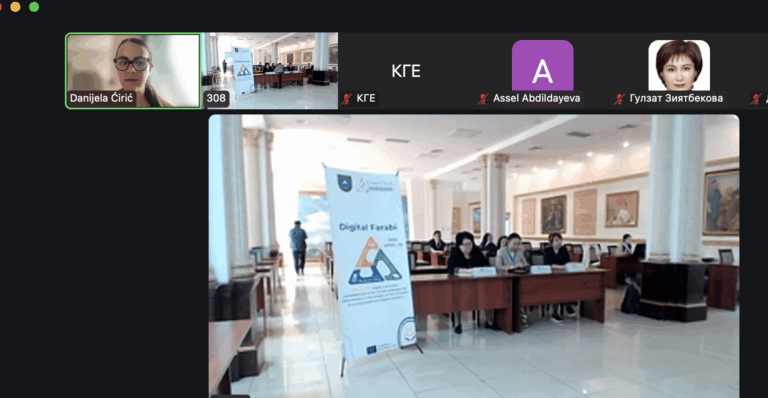Strengthening EU–Central Asia Cooperation on Green and Digital Skills Development
As part of the prestigious III International Forum “Digital Farabi”, held on April 26, 2025, in Almaty, Dr. Danijela Ćirić Lalić from the University of Novi Sad delivered a welcome address and participated in the session titled “Digital and Green Skills for the Future: Adapting the Labor Market to the Transition Towards a Sustainable and Digital Economy.” The forum was hosted by Al-Farabi Kazakh National University with support from the Ministry of Science and Higher Education of Kazakhstan, Ministry of Digital Development, the Akimat of Almaty, and the Erasmus+ National Office Kazakhstan.
The event brought together key stakeholders from government, academia, and industry to explore future-oriented topics such as artificial intelligence, digital transformation, sustainable education, EdTech innovation, and academic entrepreneurship. Within this framework, the GreenTech Horizons project was highlighted as a successful example of EU-funded collaboration bridging Europe and Asia.
GreenTech Horizons as a Catalyst for Sustainable Academic Innovation
In her address, Dr. Ćirić Lalić emphasized the importance of higher education institutions in building competencies for the green and digital transition. She presented GreenTech Horizons as a practical and structured approach to integrating green, digital, and business skills into higher education programs.
Key messages included:
- The strategic role of EU–Central Asia academic cooperation in addressing emerging labor market demands;
- The value of Erasmus+ Capacity Building in Higher Education (CBHE) projects in modernizing curricula and supporting education reforms;
Concrete examples of curriculum co-design, data-informed teaching innovation, and opportunities for joint initiatives.
Participant Engagement and Dissemination
The online session was attended by over 60 participants, including students and faculty from Kyiv Polytechnic Institute, researchers, policymakers, and industry professionals. Participants shared highly positive feedback, particularly noting:
- The clarity of GreenTech Horizons’ competency-oriented framework;
- The relevance of integrated green and digital competencies;
- Strong interest in joining future project activities and co-developing academic materials.
The presentation was disseminated through multiple channels, including institutional websites, ESC4ERG module networks, and social media platforms. The speaker also shared key insights in a LinkedIn post, helping broaden visibility within international academic circles.


